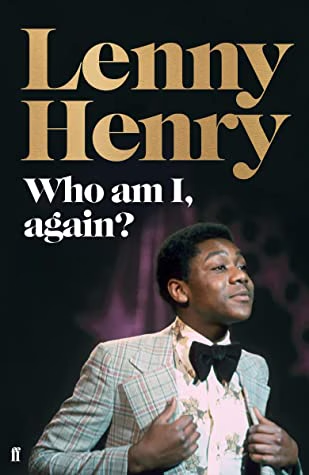Growing up with Lenny Henry as a stable diet of light comedy his early years story was enlightening.
I'm not sure if as a kid I loved or disliked Lenny Henry - he just was a huge space in comedy TV, and now thinking it's probably his work with Comic Relief that I remember more than anything.
In the last year or so, I caught a much more recent (to me) show Live at the Apollo which made me realise that he also appealed to adults and I really enjoyed it - much more than I had expected.
So in seeing Lenny Henry's biography (albeit a "part 1") I felt I owed it to my childhood to learn more about this man and his journey.
Who Am I, Again covers Henry's early years of life, from being born in the UK right in the process of his family immigrating from Jamaica all the way up to the 1980s.
He writes about his time and own personal struggle staring in the "Black and White Minstrel Show", and writes about his family being on the breadline for so long and his upbringing.
Racism is peppered throughout the book and I suspect played down for us the reader. There's a shocking anecdote that Henry tells of how when he and Dawn French's home was published in a newspaper, their front door was quickly defaced with excrement.
Lenny Henry also writes of his work on The Fosters - the UK's first comedy series with predominantly black performers.
I personally tend to find non-fiction hard to read (or rather it's can be a very slow read for me) but Henry's biography was easier to read - and perhaps because he played such a large part of my childhood TV.
The book ends abruptly at the start of the 1980s - which is really the time I knew Henry from and I felt myself wanting to learn more. Page-wise the book also ends with around 10% remaining, and what remains are tips for new comedians - which I mostly skimmed although there were a small handful of useful items I can imagine it would be valuable to younger comedians.
5 Highlight(s)
Nelson Mandela once said, 'Forget the past.' In many respects I think he was right. The past can appear to be this other country, this exalted place where you spent so much time and where so many things happened that were good or bad or painful, and it's difficult to let go, but in the living of life there is forward movement and so you wind up letting go anyway, just by virtue of putting one foot after the other.
I arrived first, wearing my snazzy Freemans catalogue checked jacket, which I was painstakingly paying off at the rate of 15p a week.
This gradual see-sawing in my bodyweight would continue for the next thirty years.
But having lived through riots and insults and people touching my hair on the bus and telling me it's like Velcro, people spitting on their fingers, rubbing my face and saying, 'Ooh look, it doesn't come off,' maybe this is the time to stand up and tell people to back off.
There's something to be said for really working your material until it shines like a jewel, so that you can do it in any condition - happy, sad, overweight, underweight, joyous, depressed as buggery. If you have an act you can do anytime, anywhere, anyhow … then that is a fine thing.
